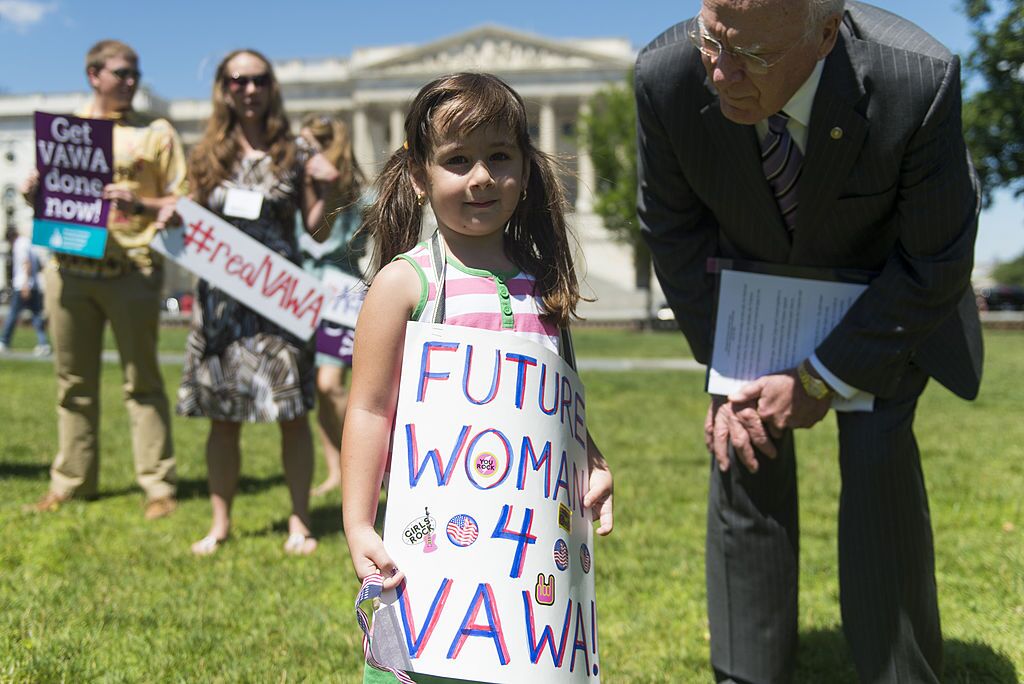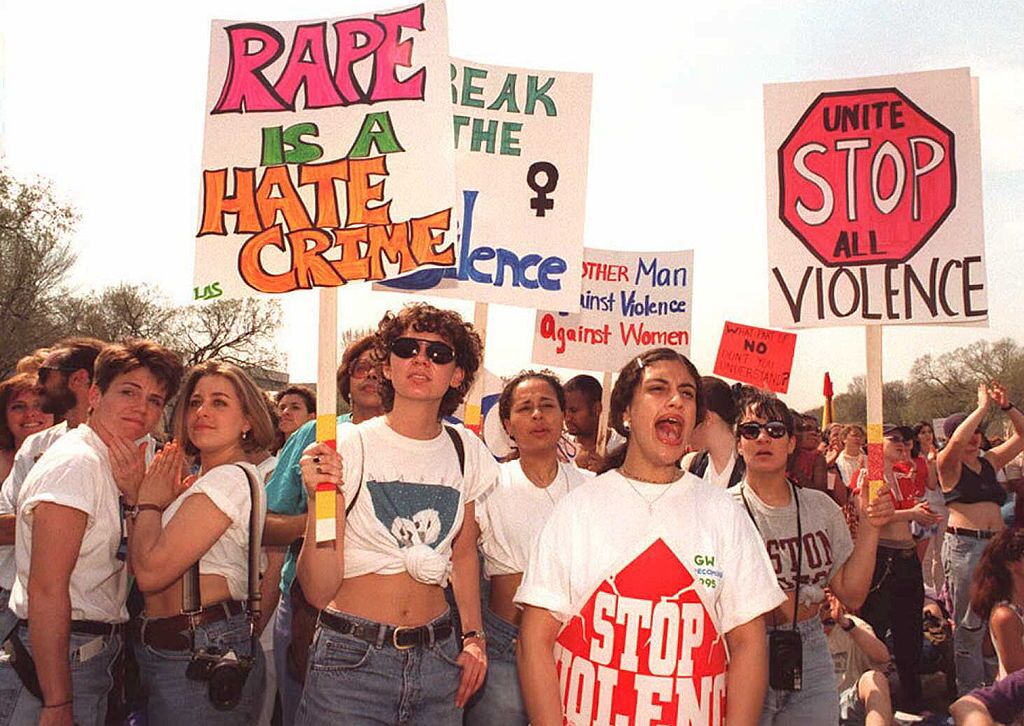Welcome to DU!
The truly grassroots left-of-center political community where regular people, not algorithms, drive the discussions and set the standards.
Join the community:
Create a free account
Support DU (and get rid of ads!):
Become a Star Member
Latest Breaking News
Editorials & Other Articles
General Discussion
The DU Lounge
All Forums
Issue Forums
Culture Forums
Alliance Forums
Region Forums
Support Forums
Help & Search
Women's Rights & Issues
Related: About this forumThirty Years of the Violence Against Women Act Shows Progress Is Possible
Thirty Years of the Violence Against Women Act Shows Progress Is Possible
PUBLISHED 9/12/2024 by Esta Soler
Today, more Americans than ever recognize family violence as a societal problem, worthy of public attention and investment. The Violence Against Women Act helped make that happen.

Sen. Pat Leahy, D-Vt. with Roya Knock, then age 5, at a National Organization for Women (NOW) and National Task Force to End Sexual Assault and Domestic Violence Against Women rally for the reauthorization of the Violence Against Women Act (VAWA) on June 26, 2012, on the east front of the Capitol. (Bill Clark / CQ Roll Call)
On a long list of issues in the newly released YWomenVote survey, women identified domestic and sexual violence as the third most important one facing U.S. women collectively. It’s not a surprise to those of us working to stop this violence that it was behind only abortion access and the economy/cost of living. As we mark the 30th anniversary of the Violence Against Women Act on Friday, Sept. 13, at this time of so much cynicism and division, it’s worth remembering one lesson that law teaches: Progress is possible.
VAWA’s passage was truly a turning point for our country. This transformative, imperfect but ever-improving law was well worth the years-long effort to get a recalcitrant Congress to pass it. That work was excruciating at times. We had to listen to lawmakers dismiss brutal murders as “lovers’ quarrels that got out of hand.” Some expected us to laugh when they accused us of “trying to take the fun out of marriage.” Many insisted domestic and sexual violence were private matters best handled by families. Never mind the health and economic costs, the dangerous law enforcement engagements, or the trauma that for many lasted a lifetime. The consensus among Washington powerbrokers—mirroring public sentiment at the time—was that issues of domestic violence and sexual assault didn’t belong in the public domain. That has changed. Policymakers and Americans more broadly now recognize family violence as a societal problem, worthy of public attention and investment. And the Violence Against Women Act helped make that happen.

President Joe Biden during an event celebrating the reauthorization of the Violence Against Women Act, in the East Room of the White House on March 16, 2022. (Nicholas Kamm / AFP via Getty Images)
. . . . . .
Keep looking to improve the law. VAWA provided funds for urgently needed services; improved legal responses; brought health care providers, schools and other institutions into the work; introduced training for judges and law enforcement; launched the National Domestic Violence Hotline; and more. But it wasn’t enough, and we worked continuously to improve and expand the law, making changes to ensure fewer people would be caught up in the criminal justice system, expand it to more communities, provide economic support to survivors, promote prevention, and address the needs of children and youth growing up in homes with violence. We improved VAWA each time it was reauthorized.
. . .
Keep up with the times. New technologies and new circumstances (like COVID-19) pose new challenges, and the public policy response has often been inadequate or slow. As a country, we’ve done a poor job of addressing the online abuse, stalking and harassment that are so common, the human trafficking that is present in too many communities, and the growing isolation of young men that often feeds violence and hate. We need to be more nimble and aggressive in meeting emerging challenges because they won’t solve themselves. Thirty years after VAWA, I am confident we can continue the progress and that a new generation will prioritize and bring passion and creativity to this work. It will take resolve and political leaders willing to put aside differences and work together to make our homes and communities safer—just as it always has.

A pro-women’s rights demonstration on April 9. 1995, in Washington, D.C. (Joyce Naltchayan / AFP via Getty Images)
https://msmagazine.com/2024/09/12/thirty-years-violence-against-women-act/
InfoView thread info, including edit history
TrashPut this thread in your Trash Can (My DU » Trash Can)
BookmarkAdd this thread to your Bookmarks (My DU » Bookmarks)
0 replies, 313 views
ShareGet links to this post and/or share on social media
AlertAlert this post for a rule violation
PowersThere are no powers you can use on this post
EditCannot edit other people's posts
ReplyReply to this post
EditCannot edit other people's posts
Rec (3)
ReplyReply to this post